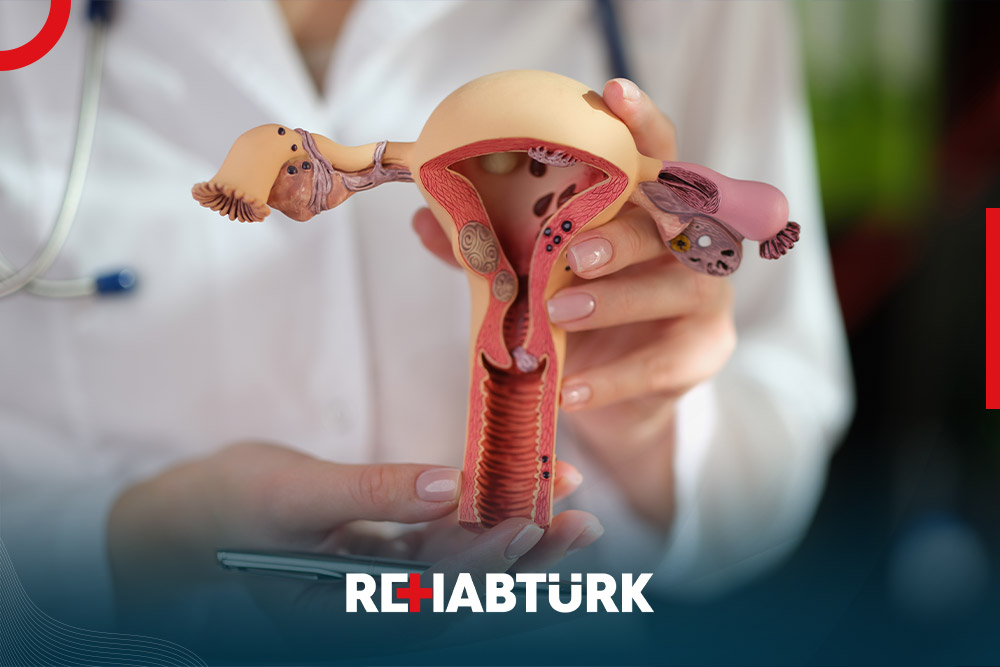Cervical cancer treatment in Türkiye
Cervical cancer used to be a leading cause of death among women, but that has changed since screening tests became widely available.
Where is the cervix located and what is it?
The cervix is a hollow cylinder that connects the lower part of a woman’s uterus to the vagina. Most cervical cancers begin in the cells on its surface.
Symptoms of cervical cancer
Many women with cervical cancer don’t realize they have the disease early on because it usually doesn’t cause symptoms until the later stages. And when symptoms do appear, it’s easy to confuse them with common conditions like menstrual periods and urinary tract infections.
These symptoms include:

- Unusual bleeding, such as during menstrual periods, after sex, or after menopause
- Vaginal discharge that smells different than usual
- pelvic pain
- Needing to urinate often
- Pain while urinating
When you notice any of these symptoms, please see your doctor for the necessary examination.
Causes of cervical cancer
For information, infection with one of the types of human papillomaviruses for cancer does not mean the inevitability of cervical cancer, because the immune system eliminates the vast majority of HPV infection within two years.
There are about 100 different types of HPV and the two most common types behind infection are HPV-16 and HPV-18.
HPV is the biggest risk factor for cervical cancer, and there are other causes that can increase the risk as well
- human immunodeficiency virus (HIV)
- Chlamydia is a type of germ
- smoking
- Obesity
- Pre-cancerous genetic conditions
- A diet low in fruits and vegetables
- Take birth control pills
- Three successful pregnancies
- or when pregnant under the age of 17.
There are also some types of HPV that can also cause other cancers for both women and men, such as:
- Vulvar cancer
- penis
- anal
- rectum
- throat
How is the treatment done?
We should know that cervical cancer is highly treatable if detected early and the four main treatment methods are:
- surgery
- Radiotherapy
- alchemist
- preventative
Sometimes the patient is subjected to all these treatments to make them more effective
The surgery removes as much of the cancer as possible, and sometimes the doctor can remove only the area of the cervix that contains the cancerous cells. With more widespread cancers, surgery may involve removing the cervix and other organs in the pelvis.
Radiation therapy
Where radiation kills cancer cells using high-energy x-rays . And it can be delivered through a machine used from outside the body or from inside the body using a metal tube placed in the uterus or vagina.
Chemotherapy
Chemotherapy uses drugs to kill cancer cells throughout the body. Doctors give this treatment in certain cases. The patient has chemotherapy for a period of time and then stops the treatment to give the body time to recover.
Preventive treatment
It is a type of new drug that works in a different way than chemotherapy and radiation. Its purpose is to prevent the growth of new blood vessels that help cancer grow and survive. This drug is often given along with chemotherapy.
Stages of cancer spread
Stage 1 :
The cancer is small and may have spread to the lymph nodes and has not spread to other parts of the body.
Stage 2 :
As the cancer is larger and has spread outside the uterus and cervix or has reached the lymph nodes and has not reached other parts of the body.
Stage 3 :
As cancer has spread to the lower part of the vagina or to the pelvis and may block the tubes that carry urine from the kidneys to the bladder and has not spread to other parts of the body yet.
Stage 4:
Cancer may spread outside the pelvis to organs such as the lung, bone, or liver .
Cervical cancer test
First, a smear of cells from the cervix is taken to test for a tumor. To perform this test, a doctor collects a sample of cells from the surface of the cervix. These cells are then sent to a laboratory to be examined for precancerous changes. And if any of these changes are found, the doctor may suggest colposcopy, which is a procedure to examine the cervix. During this test, the doctor may take a biopsy of cervical cells.
Many doctors recommend the need for periodic examinations as follows:
Ages 21 to 29: Pap smears should be done every three years.
Ages 30 to 65: You should get a Pap smear every three years or get a test.
High-risk HPV every five years.
Diagnosis of cervical cancer
For cervical cancer that was discovered in its early stages, it is confined to the cervix, and the five-year survival rate for women infected with it is estimated at 92%.
Once the cancer spreads to the pelvic region, the rate drops to 56%.
If the cancer spreads to distant parts of the body, the survival rate is only 17%.
Regular testing is important for early detection of cervical cancer because when this cancer is detected early, it is more treatable.
Cervical cancer surgery
There are several different types of surgery that treat cervical cancer, depending on which type the doctor recommends and how far and how far the cancer has spread
- Cryosurgery: It freezes cancer cells with a probe placed in the cervix
- Laser surgery by burning infected cells with laser beams
- conicectomy
This procedure is done using a surgical knife, a laser, or a thin wire that is heated with electricity.
Or the entire uterus or cervix is removed. This operation is called a radical hysterectomy. Through a cervical resection, the cervix and the top of the vagina are removed, leaving the uterus in place so that the woman can bear children in the future. The pelvis, vagina, bladder, rectum, lymph nodes, and part of the uterus may be removed. from the colon, depending on where the cancer has spread.
Prevention of cervical cancer
One of the easiest ways to prevent cervical cancer is to get regular screening using a smear. The test catches potential cells and can treat them before they turn into cancer.
Since HPV infection is the cause of most cases of cervical cancer, it can be prevented with the Gardasil and Cervarix vaccines.
Vaccination is most effective before a person becomes sexually active and both boys and girls can be given vaccines against HPV.
There are other ways. Here are some of the ways you can reduce your risk of contracting HPV and cervical cancer
- Limit the number of sexual partners
- Always use a condom or other method of restraint when having vaginal, oral, or anal sex
An abnormal Pap smear result indicates the presence of precancerous cells in the cervix.
Information about the tumor when the patient is a carrier
Most cancers during pregnancy are detected early in pregnancy.
Cancer treatment during pregnancy can be complex. Therefore, it is advised to see a doctor to help determine treatment based on the stage of cancer and the duration of pregnancy.
If the cancer is at a very early stage, the patient may be able to wait until delivery before starting treatment.
In more advanced cases, a hysterectomy or radiotherapy may be suggested, at which point the patient will need to decide whether or not to continue with the pregnancy.
In these cases, doctors will try to deliver the baby as soon as it is able to survive outside the womb.
How can I book for cervical cancer treatment in Türkiye?

- Free medical support on the phone: You will have a dedicated representative for your health condition who is always ready to answer your questions.
- Free consultation with a specialist doctor: Your medical representative will consult with a number of doctors and hospitals to find the best possible treatments.
- Free travel visa arrangement: We will contact the embassy in your country to assist you in obtaining a visa to visit Türkiye.
- Free itinerary planning: We will create a schedule for your medical trip to Türkiye.
- Free translation of documents and reports: We will translate medical documents and reports into Turkish on your behalf.
- Free support and monitoring: We will monitor the stages of treatment and be by your side every step of the way.
- Free instant translation: We will be with you during the treatment stages to provide translation between you and the medical team.
- Free accommodation and transportation coordination: We will book accommodation for you and your companions in Türkiye, along with transportation services.
Contact REHABTÜRK doctors for more information about the procedure and to evaluate your medical condition.

